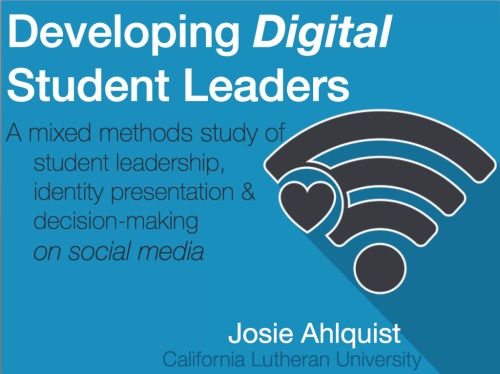Mental Health Roundup
This contains some of the latest news in social work, healthcare, private practice and more! Note that there is a second NASW Virtual Career Fair coming up on Feb 9, 2016!
This week’s wrap-up has 5 main themes:
- Healthcare/Sensitivity
- Advocacy/Policy
- Therapy/Relationships
- Technology and Mental Health
- Career/NonProfit
Healthcare/Sensitivity
- Antidepressant usage linked to bipolar and mania – Medical News Today shared that the evidence for long-term use of antidepressants increasing an individual’s risk of a future bipolar or manic phase is steadily mounting.
- Are Mass Shootings Contagious? Nora Kelly describes the results of a recent study out of Arizona State University that illustrate that some shooting incidents appear to lead to a cluster of shootings; the contagious effect can last up to six weeks.
- “Because I Am Loved” – Vilissa Thompson interviews the author of an inspiring children’s book; he shares how being the brother of a sibling with a disability helped him become more sensitive and nurturing.
- Before I forget – All in the Mind interview with Christine Bryden who had been in her 40s when she first received a diagnosis of dementia. She is an inspiring author who finds joy in the present moment and offers guidance on how to live with the disease.
- Cigarette smoking may enhance vulnerability for cannabis dependence – Andrew Jones describes the results of a study that shows that marijuana use and tobacco use predict dependence cross-sectionally; this raises concerns particularly in light of the increased medicalization and legalisation of marijuana around the world.
- How Language Influences Emotion – Gracie Lofthouse discusses how vocabulary can affect the experience of feeling and learning new words for emotions means you might be able to identify those emotions as they come up in your own experience.
- Rights-based approaches to living better with dementia – extract from Shibley Rahman’s book provides some guidance for how dementia may be viewed as disability, and how reasonable adjustments may be made for people living with dementia.
- Self-Care for Social Changemakers – Beth Kanter shares self care guidance from Aisha Moore; “taking care of yourself is part of the work that nonprofits and change makers do in order to take care of others,” and suggests you create a self-care plan to attain greater well-being and life/work balance.
Advocacy/Policy
- Charting New Pathways Out of Poverty – Peter Manzo advocates understanding who the poor are and what their needs are, using a basic needs budget that describes region-specific hardships for families and the tradeoffs they face on a regular basis vs. the widely used US federal poverty level (FPL) which vastly understates poverty.
- Race, Class, Sexism, Student Affairs, Higher Education – Relando Tompkins shares highlights from 6 articles he’s read including how many minority millennials are struggling, white people can do more to undo racism, the microaggressions women face on a daily basis and more.
- Racial Justice: Moving From Macro to Micro and Back Again – Melinda Hohman advocates being both micro and macro in addressing racial injustice; strengths-based approach may put focus on individual to the neglect of racial injustice; ask: “How are you experiencing/learning about racial injustice?” And then listen.
- Social Capital: The Key to Macro Change – Rachel West shares some valuable resources for the twitter chat that took place about social capital and the role this plays in Macro Change; archive of twitter chat
- Social Work Month 2016 – “Forging Solutions out of Challenges” has been selected as the theme of social work’s month (March) to recognize the contribution of social workers at all levels of society.
- ‘Social workers save lives…” – Kate Murray reports that while about 80% of social workers surveyed by the Guardian love their jobs, a quarter plan to leave the sector in the next five years, due to unreasonable work loads/stress.
- Strengthening families, not just marriages – in Social Mobility Memos, income pooling appears to by far the most important factor in preventing poverty; teens and young adults would benefit from following the “success sequence” of getting an education, a job and a steady partner before conceiving.
- Testing Welfare Recipients Perpetuates The Cycle of Poverty – Christine Rose Phelps argues that instead of decreasing/revoking benefits, we need to be investing in education, treatment, social services programs and other preventative measures.
- In US, poverty dampens genetic influence on IQ – an analysis of data from several studies indicates that in the U.S., genetic influence on intelligence varies according to socioeconomic status, but not in Western Europe or Australia. The relatively strong health and social-welfare programs abroad seem to buffer against some of poverty’s effects.
- Why Australia Bit The Bullet & Pulled The Trigger On Gun Control – Courtney Kidd provides a powerful argument for gun control – there will be fewer suicides, mass shootings, and a reduction of both crime and the people injured at the time of the crime.
Therapy/Relationships
- Five Competencies of Social and Emotional Learning – Alexandra Samuel provides a helpful summary of the five competencies our clients may wish to master to achieve overall wellbeing.
- 5 Helpful Dating Questions – Stephen Borgman shares Dr. Duana Welch’s dating and some helpful resources; these resources could be helpful to share with any clients who suffer from social anxiety or shyness.
- 5 Kid-Friendly Yoga Poses To Help Children Cultivate Patience – Erika Prafder shares five of Susan Verde’s child-friendly yoga poses to help children build stress management skills.
- Does Self-Help Work? – Ricky Greenwald describes his research-backed trauma-informed treatment book “Slaying the Dragon: Overcoming Life’s Challenges and Achieving Your Goals,” and how it may be helpful to both therapists and clients.
- HEArt for Veterans: Identifying the Hidden Emotion – inSocialWork podcast interview with Dr. Howard Lipke about a special approach he developed to help vets prepare for sensitive situations in which they may feel triggered into anger/rage.
- How to Have Less Anxiety During The Holidays – Emily Roberts provides some helpful suggestions to reduce anxiety such as: recognizing your emotions, letting go of perfection, doing small things to feel control, slowing down and spending time alone.
- I See You – Jeff Levy…” incredible honor… to be trusted with stories of pain and suffering… pain and suffering are an inevitable part of the human condition. But so is the strength and unflagging energy we expend each day, facing the perils and the joys of humanity…”
- Journal-Writing with Your M.O.S.S. – JournalTalk podcast interview with Dima Dupéré… talks about how to use “What’s Going on in Your M.O.S.S.” with clients… writing about relationship with Myself, O – anything to do with any others, S – systems and structures, and S – senses and sensibility. For time limited period, you may receive a free copy of her journaling book!
- The Link between Cognitive Behavior Therapy and Positive Psychology – Dennis Greenberger suggests integrating positive psychology principles and findings into the CBT model to help clients get better, develop a sense of purpose and experience improved overall well-being.
- Parent-child relationship problems: Treatment tools for rectification counseling – Monika Logan shares some important fallacies such as children never unreasonably reject mothers that can compromise the therapeutic process, as well as various treatment tips.
- Perfectionism Worksheet – Julie Hanks shares a helpful worksheet to combat holiday perfectionism but it may be adapted for use to address perfectionism at any time.
- Self-Esteem Stars (and How to Effectively Praise) – Carolyn Mehlomakulu describes how to use self-esteem stars to reinforce praise in a young client/child. She suggests that you encourage a “growth mindset” and be specific with the praise, tying it to a concrete example and highlighting a positive aspect that you want to reinforce.
- Teaching Neuroscience To Our Clients – in a video, Dan Siegel shares an example from his own work with a client who found himself in an upsetting situation and then successfully applied neuroscience learnings on mirror neurons to bring himself out of distress.
Technology and Mental Health
- The Age of #DigitalLiteracy and the Media Revolution – Pat Shelly shares key take-aways from Geneva Overholser’s keynote presentation on digital literacy including the importance of maintaining an healthy media diet, as well as UBSSW’s series of video clips on how to maintain a professional social work identity.
- After School, Another Anonymous App for Teens – this app works a lot like Yik Yak where users post brief comments and local users can see what was posted but not who posted it; there will always be new apps; teaching our kids to interact with kindness and integrity online is key.
- #ARNOVA15 Annual Conference – Jimmy Young shares a copy of his presentation, illustrating the value of applying digital literacies to nonprofit advocacy.
- Create an animated Cochrane Video – Alex Weaver offers guidance on how you can create an instructional video such as: tailoring the content based upon your target audience and their level of knowledge, keeping it short, providing narration with visuals and more.
- The Easy Fix For a Common HIPAA Mistake: Encrypt Your Gear! – to protect client data and avoid HIPAA fines, Roy Huggins advises we get “full-disk encryption” or “full-device encryption” on our computer equipment and backup equipment.
- Developing Digital Student Leaders – Josie Ahlqvist shares with us a copy of her open-access dissertation, the results of which suggest college student educators should implement holistic digital leadership education, with a focus on student groups, social communities, and social change.
- Developing The 21st Century Social Worker – socialworkpad provides illustrations of how the University at Buffalo School of Social Work is helping students use and understand the value of technology for the profession.
- ‘Huggable’ Robot Bear Fills Need for Pediatric Support – Robert T. Muller describes the use of an innovative plush blue robotic bear designed to serve as a companion and to alleviate some of the stress or pain associated with a child’s hospital stay.
- #ProjectClarence returns to #SPSM – archive of tweets from the 12/13/15 suicide prevention social media chat… #ProjectClarence = Holidays + #SocialMedia + Video + #Suicide Prevention.
- Social Worker on the Shelf, and What Barbie Has Taught Me About Feminism – Stephen Baldridge explains how he uses the “Social Worker on the Shelf” on Instagram to show “Linda” in various social work situations and roles throughout the month of December.
- Social Work Scholarship in the Age of Social Media – Laurel Hitchcock shares a video of a discussion that took place on this topic (#APM2015), as well as her thoughts on some of the benefits of using social media for social work scholarship.
- Tools for Practice Tuesday: @INorupt – Sean Erreger describes INorupt as a new online directory of technologies for organizations; its exhaustive list includes everything from mental health to human trafficking.
- Website Trustworthiness: How Can You Tell? [own] – to avoid being duped by misinformation, hoaxes or scams, ensure that the websites you rely on for information pass Howard Rheingold’s Currency, Reliability, Accuracy and Purpose detection test.
- 5 Nonprofits Trends to Watch in 2016 – Nell Eddington cites new opportunities for the nonprofit sector to lead, an uptick in social protests, greater use of networks, more state-by-state strategies and more flexible and effective funding as key upcoming trends.
- 5 Ways to Rank Higher in Google – Joe Sank advises you determine your keywords based upon the services/specialties you have, file with “Google My Business” to ensure you pop up for searches conducted in your area, write blog posts that support searches using your selected keywords and more.
- NASW Virtual Career Fair – Feb 9 at 12-4PM EST register to connect directly with employers with open career opportunities from the comfort of your home, office, smartphone or tablet.
- Overcoming Money Shame – Selling the Couch Podcast interview with Jane Carter; many therapists struggle with accepting money for their services. Jane advises therapists to do their own work around money, and engage in it from a place of curiosity instead of judgment to create a peaceful relationship with it.
- Therapists & Taxes: Do This BEFORE December 31st! – Miranda Palmer recommends that you figure out how much you will owe in taxes because there may be some steps that you can take before the end of the year to say yourself some money such as moving from a sole-proprietorship tax structure to a corporation tax structure.
- Top 5 Things to Know About Insurance Billing – for those of you planning to work with insurance clients, Maelisa Hall advises having a short-term treatment plan, understanding how the insurance firms define medical necessity, being able to describe your client’s diagnosis and how it impairs their functioning and more.
- Wage Stagnation and the Undervalue of Social Workers – Clint Robson, comparing social workers and what is required of them to what is required from police, fire and ambulance personnel, is making a strong call for action for improvement of conditions for social workers.
- What’s the easiest way anyone can have a big social impact? – Benjamin Todd suggests taking whichever job you’d find most personally fulfilling, and giving 10% of your income to the world’s poorest people through GiveDirectly. That extra income will make a big difference to the quality of life of the poorest people and is likely to make you happier.
- Your Social Work Brand: The Anatomy of an Elevator Pitch – Kristin Battista-Frazer provides some guidance as to how you may construct your elevator pitch. You’d want it to include these key four elements: who you are, what you do, your expertise and time permitting, some successes.





